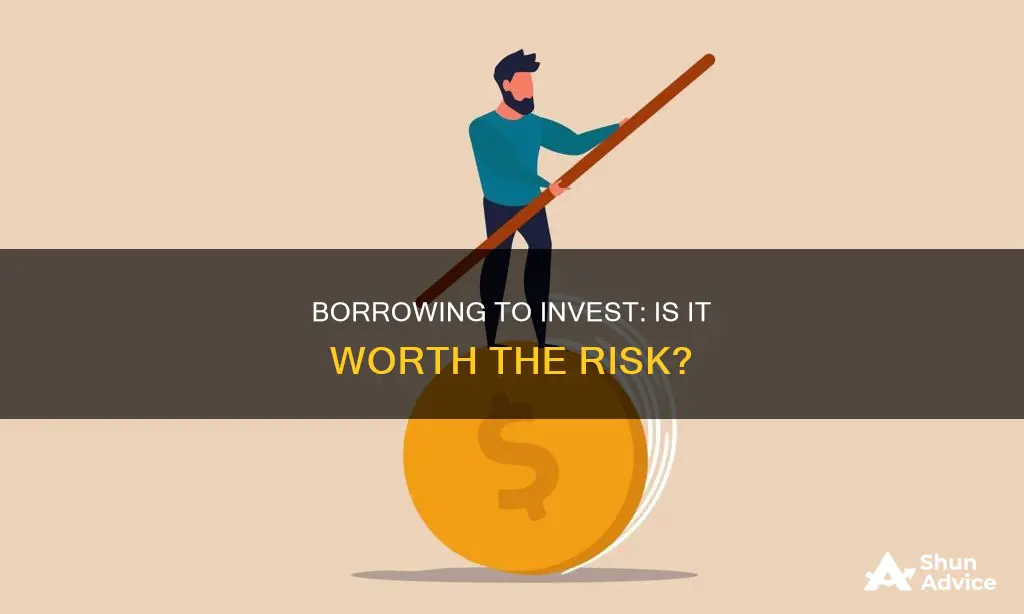
Borrowing money to invest is a risky strategy that can amplify both returns and losses. While it may be tempting to take out a loan to invest, this approach carries significant risks that may outweigh the potential rewards. The decision to take out a loan to invest should be informed by a thorough understanding of your financial situation, risk tolerance, and investment goals.
Taking out a loan to invest, also known as investing a loan, involves using borrowed funds to purchase securities, real estate, or other investment assets. The expectation is that the returns on these investments will exceed the cost of the loan, including interest and fees. While this strategy can potentially lead to higher profits, it also comes with inherent risks and should be approached with caution.
One key consideration is the level of risk associated with the investment. High-risk investments, such as the stock market or derivatives, are generally not advisable for investing with borrowed funds. Instead, low-risk investments with a high return on investment (ROI) and a low level of risk are more suitable for this purpose.
Another important factor is your financial situation and risk tolerance. Taking out a loan to invest is generally more appropriate for experienced investors with higher risk tolerance, stable financial situations, and a clear understanding of the potential benefits and drawbacks. It is crucial to assess your risk tolerance and ensure you are comfortable with the potential losses.
Additionally, the cost of borrowing plays a crucial role in the profitability of investing with a loan. High-interest rates can significantly reduce or negate any potential gains from the investments. Adjustable or variable-rate loans can also quickly become more expensive if interest rates rise.
Before considering taking out a loan to invest, it is essential to evaluate your financial goals, risk tolerance, and overall financial situation. Consulting with a financial advisor can help determine if this strategy aligns with your financial plan.
| Characteristics | Values |
|---|---|
| Should you take out a loan to invest? | It depends on your financial situation and risk tolerance. |
| When does it make sense to take out a loan to invest? | When the return on investment (ROI) is high and the level of risk is low. |
| What are the pros of taking out a loan to invest? | Potentially higher returns, flexibility to invest in a range of assets, ability to invest more than your current cash balance allows. |
| What are the cons of taking out a loan to invest? | Increased risk of losses, additional interest and fees, worsened debt-to-income (DTI) ratio, potential negative impact on credit score and collateral. |
| What are the risks of taking out a loan to invest? | Magnified losses, fluctuations in interest rates, difficulty meeting loan repayment obligations, negative impact on credit score. |
| When is taking out a loan to invest not recommended? | When the investment is risky, you have a low credit score, you can't afford a failed investment, or you're nearing retirement age. |
| What should you consider before taking out a loan to invest? | Your investment knowledge, current loan rates, financial portfolio, and personal risk tolerance. |
What You'll Learn

The pros and cons of taking out a loan to invest
Taking out a loan to invest can be a risky strategy, but it may pay off in some cases. Here are some pros and cons to help you understand the potential benefits and drawbacks.
Pros:
- Potential for Amplified Returns: Borrowing money to invest can allow you to acquire a larger position than you could with your existing cash balance. If the investment performs well, the leverage will increase your returns.
- Flexibility: Personal loans are generally free of spending restrictions, giving you the flexibility to invest in a range of assets or securities.
- Career and Financial Growth: Taking out a loan to invest in your career advancement or a side hustle can be a wise decision if it increases your chances of earning a competitive income or boosting your monthly earnings.
Cons:
- Risk of Loss and Increased Debt: Investing with a loan adds leverage, which can amplify both gains and losses. If the investment loses value, you will still need to repay the loan with interest, potentially resulting in substantial financial losses.
- Credit Score Impact: Defaulting on a loan or missing payments can damage your credit score. Even applying for a loan can impact your score due to the hard credit inquiry.
- Interest, Fees, and Taxes: Personal loans often come with interest, fees, and taxes that can eat into your potential investment returns. The cost of the loan may outweigh the benefits, especially if the investment doesn't perform as expected.
- Retirement Considerations: Taking on additional debt as you approach retirement can put your savings at risk. It is generally not advisable to borrow to invest if you are at or near retirement age.
Before taking out a loan to invest, carefully consider your risk tolerance, financial goals, and investment strategy. Consult with a financial advisor to determine if this approach aligns with your financial plan.
Invest in Agnkul Cosmos: A Guide for Indians
You may want to see also

When to use a personal loan to invest
Using a personal loan to invest can be risky, but there are some instances where it could be the right move. Here are some scenarios where taking out a personal loan to invest may be a good idea:
- Pursuing career growth: If you need additional qualifications or certifications to advance your career, a personal loan could help you invest in your future. However, be sure to compare the interest rates with other loan options, such as a Direct Unsubsidized Loan from the federal government.
- Boosting your earnings: If you're looking to turn a hobby or passion project into a side hustle or small business, a personal loan can provide the funding you need to get started. Develop a sound business plan and ensure you have a clear strategy for generating income and paying back the loan.
- Excellent credit: If you have an excellent credit score, you're more likely to qualify for a low-interest rate on a personal loan. This reduces the risk of borrowing and increases your chances of coming out ahead.
- Affordable monthly payments: If you're confident you can afford the monthly payments on a personal loan, it could be a way to boost your investment portfolio. However, you might also consider putting that money into a high-yield savings account or exploring fractional investing.
It's important to carefully consider your financial situation, risk tolerance, and investment goals before taking out a personal loan to invest. Consult with a financial advisor to ensure this strategy aligns with your overall financial plan.
HNIs' Investment Strategies in India: Where Do They Invest?
You may want to see also

When not to use a personal loan to invest
- If the investment is risky: Investments with a higher-than-average chance of underperforming or those that offer above-average returns in a short period are considered high-risk. The stock market, for example, is deemed very risky. Adding debt to your investment portfolio increases volatility. Low-risk investments include bank deposit products like money market accounts and savings accounts, insured by the Federal Deposit Insurance Corporation (FDIC) or National Credit Union Administration (NCUA).
- If you have an average credit score: A lower credit score means you won't qualify for a lender's lowest advertised loan rate. With personal loan rates reaching 35.99% APR, the loan cost might outweigh your potential investment return. Fewer lenders will be willing to offer you a loan. Improving your credit score before applying for a loan may result in better rates and lower fees.
- If you can't afford a failed investment: No investment can guarantee returns. If you need the investment to deliver on its suggested returns to afford your personal loan, this is not advisable. You will need to start repaying your personal loan immediately, with interest. If you fall behind on payments, you may be charged late fees, and your credit score may suffer.
- If you're at or nearing retirement age: As retirement approaches, reducing expenses is crucial. Taking on debt like a personal loan as your income decreases could jeopardize your retirement savings. Defaulting on the loan could further damage your credit score and lead to lawsuits from lenders, impacting your retirement savings.
- If you have short-term financial needs or goals: Investing a loan may not be suitable if the returns on your investments won't materialize quickly enough to repay the loan on time. It doesn't align with short-term financial goals.
- If the interest rate is too high: A high interest rate can significantly reduce or negate potential investment gains. Adjustable or variable-rate loans can become costly if interest rates rise before loan repayment. Compare expected investment returns with the cost of borrowing to ensure profitability.
Equity Investment: Available for Sale?
You may want to see also

What to consider before borrowing to invest
Borrowing to invest can be a risky strategy, and it is not suitable for every investor. Here are some key considerations before taking out a loan to invest:
Risk Tolerance
Firstly, assess your risk tolerance and ensure you are comfortable with the potential downside. Borrowing to invest increases the overall risk in your portfolio. If your investments perform poorly, you could lose the invested amount and be obligated to repay the loan with interest, leading to substantial financial losses.
Interest Rates and Returns
Compare the expected returns on your investments with the cost of borrowing. If the interest rate is too high, it can significantly reduce or even negate any potential investment gains. Ensure that the return on investment (ROI) is high and the level of risk is low. For example, borrowing money at 4% to invest in a low-risk asset returning 7% could be worthwhile.
Investment Knowledge and Market Understanding
Before borrowing to invest, ensure you have a solid understanding of the market, the different types of investments and their associated risk levels, and the risks and returns of each investment vehicle.
Financial Goals and Time Horizon
Consider whether taking out a loan to invest aligns with your overall financial goals and time horizon. If you have short-term financial needs, investing with a loan may not be suitable, as investment returns may not materialize quickly enough to repay the loan on time.
Loan Terms and Conditions
Carefully examine the loan terms and conditions, including repayment schedules, prepayment penalties, and additional fees. Ensure you fully understand and can meet the obligations set out in the loan agreement to avoid legal and financial issues.
Credit Score and Debt-to-Income Ratio
Taking out a loan can impact your credit score and debt-to-income (DTI) ratio. A poor credit score may result in higher interest rates, and taking on more debt can negatively affect your DTI, which lenders use to evaluate creditworthiness.
Alternative Options
Finally, consider if there are alternative ways to improve your financial situation or invest without taking out a loan. For example, paying off existing high-interest debt provides a guaranteed return, and building an emergency fund or saving for a home down payment can be more prudent financial goals.
Unlocking Private Equity: A Guide to Smart Investing
You may want to see also

Risks of taking out a personal loan to invest
While taking out a personal loan to invest may be a tempting strategy to accelerate your savings, there are multiple risks involved that may not be worth the potential reward.
The Investment May Crash
The biggest risk is that there are no guarantees in investing. If your investment loses value, you could lose all of your money and still need to pay off your loan. When borrowing money to invest, you stand to lose even more than you put into the investment because you have to pay back the interest on the loan.
You May Owe More in Loan Interest, Fees, and Taxes Than You Earn on the Investment
Even if your investment appreciates, it may not be enough to compensate for the interest rate, fees, and taxes you'll owe. Personal loan interest rates generally range from 6% to 36% and may also contain extra charges, such as an origination fee. While personal loans generally aren't taxable, your investment gains will be, so this can eat into your earnings.
Missing Loan Payments Can Hurt Your Credit
Borrowing to invest means gambling on the investment returning enough money in time to repay your loan. If this doesn't happen and you default on your loan, your credit score will take a hit. Missing even one monthly payment can hurt your credit score because payment history accounts for 35% of your FICO Score.
You'll Have More Debt
Regardless of how your investment performs or how quickly you pay off your personal loan, you'll still have taken on more debt, which can hurt your debt-to-income (DTI) ratio and, thus, your credit score. Even just applying for a personal loan can hurt your credit score since lenders need to do a hard credit inquiry to determine if you qualify.
Lender Restrictions
Some lenders expressly prohibit borrowers from using loan funds to invest. For example, online lenders Upgrade and SoFi both prohibit using a personal loan to invest. If lenders don't allow it, that should be a red flag about the risks involved.
You Can't Afford a Failed Investment
No investment can offer a 100% guarantee on returns, and you'll need to start repaying your personal loan immediately, with interest. If you fall behind on payments, you may also be charged late payment fees.
You're at or Nearing Retirement Age
As you approach the end of your working years, you should aim to reduce your expenses. Adding debt like a personal loan just as your income decreases could put your retirement savings at risk.
You Have a Lower Credit Score
If you don't have excellent credit, you won't qualify for a lender's lowest advertised loan rate. With some personal loan rates as high as 35.99% APR, the cost of the loan might be more than your potential investment return.
You Have Short-Term Financial Goals
Taking out a loan to invest may not be a good idea if you have short-term financial needs or goals. The returns on your investments may not materialize quickly enough to repay the loan on time.
You Don't Understand the Risks
Before taking out a loan to invest, it's crucial to assess your risk tolerance and ensure you're comfortable with the potential downside. Borrowing to invest is generally more appropriate for experienced investors with higher risk tolerance, stable financial situations, and a clear understanding of potential benefits and drawbacks.
Exploring India's Investment Landscape: Who's Investing and Why
You may want to see also
Frequently asked questions
There are several risks involved in taking out a personal loan to invest. Firstly, the investment may crash, resulting in a total loss of the invested money while still needing to pay off the loan with interest. Secondly, the interest, fees, and taxes associated with the loan may exceed the returns on the investment. Thirdly, missing loan payments can negatively impact your credit score. Lastly, taking out a personal loan increases your overall debt, which can adversely affect your debt-to-income (DTI) ratio and credit score.
Taking out a loan to invest can make sense in certain circumstances. One instance is when the return on investment (ROI) is expected to be high and the risk is low. For example, if you can borrow money at a low-interest rate to invest in a low-risk opportunity with a potential return that exceeds the borrowing cost. Additionally, if you have excellent credit and can qualify for a low annual percentage rate (APR) on the loan, it may be worthwhile.
Instead of taking out a personal loan to invest, consider other options such as paying off existing high-interest debt, building an emergency fund, or saving for a home down payment. Investing in your education or business may also be a better alternative, provided you do the math and consider factors like your expected salary and opportunity cost.







